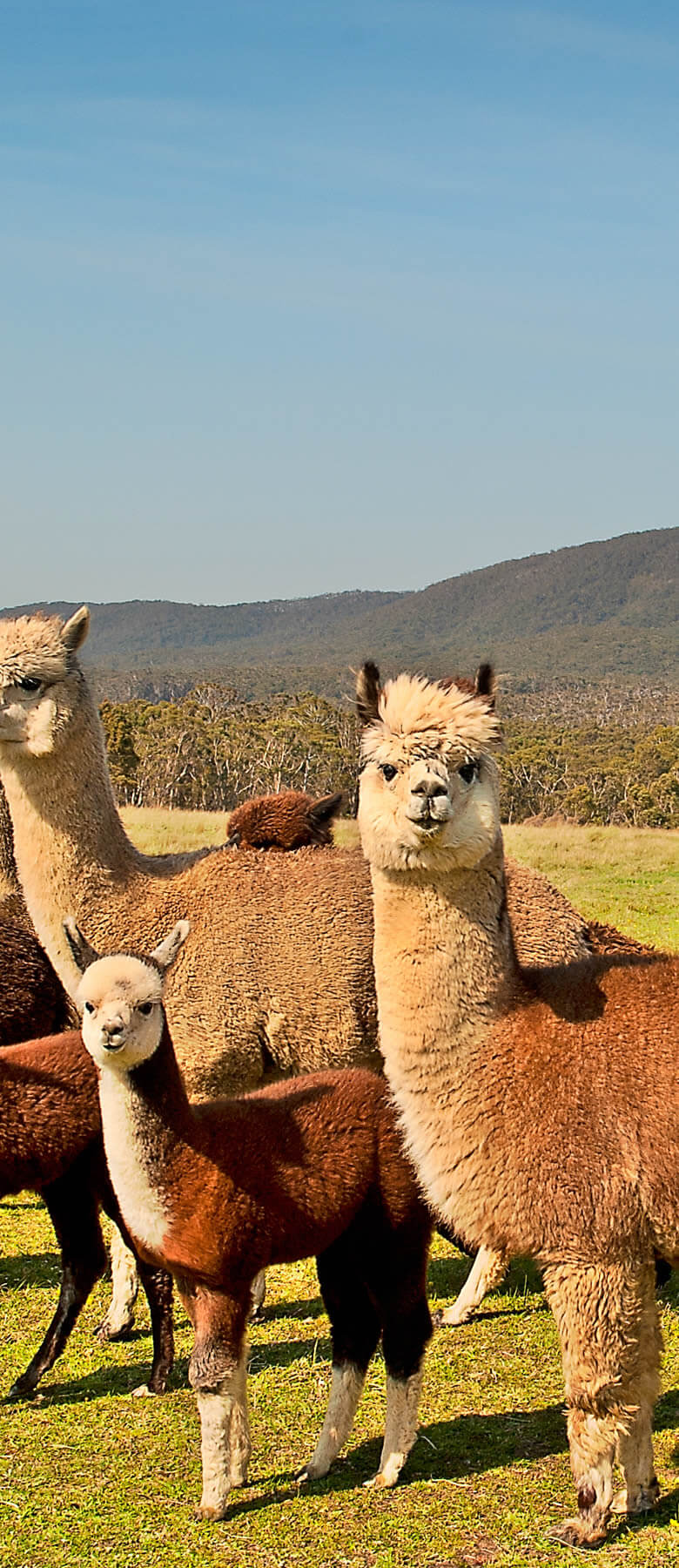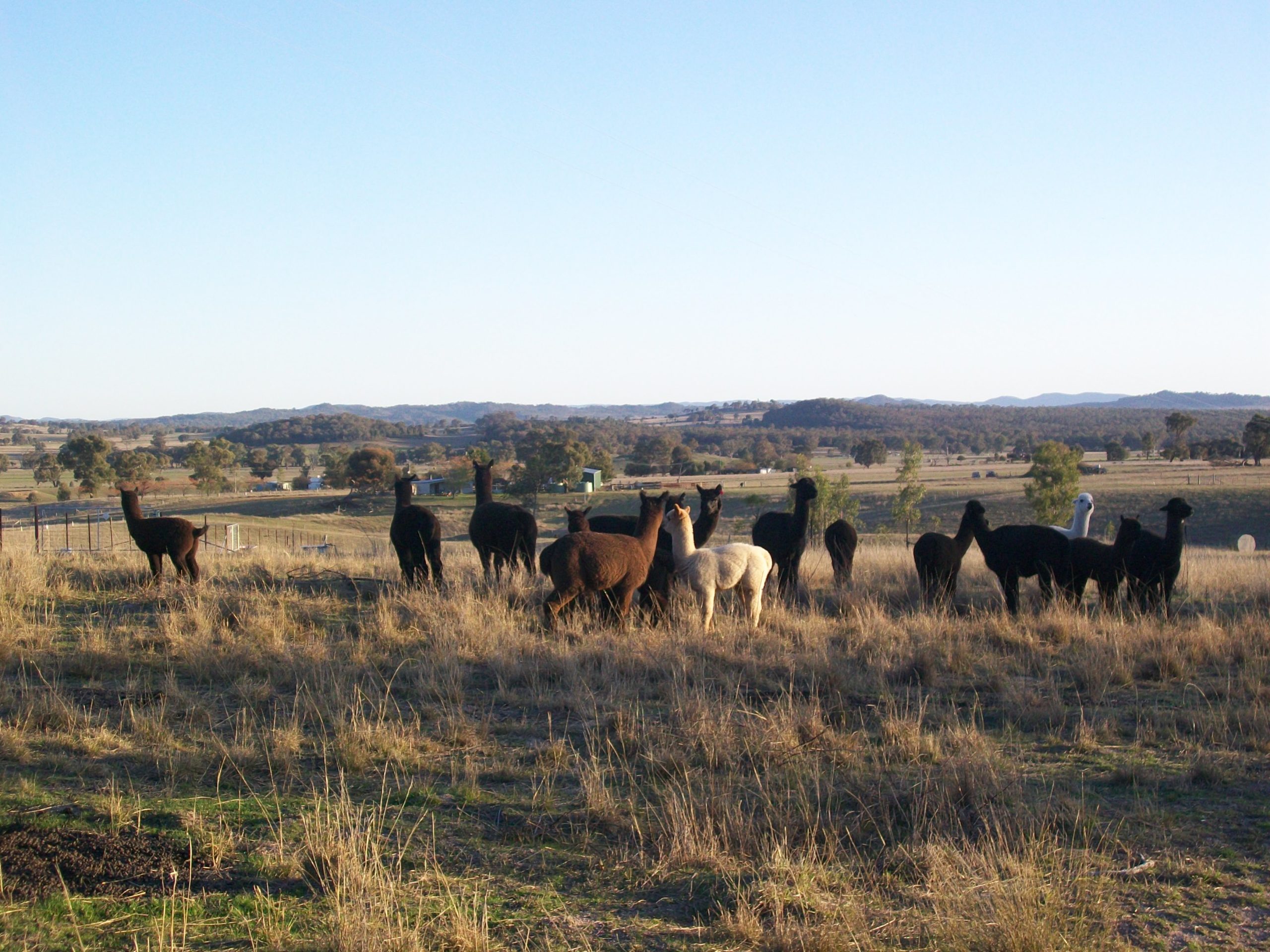Sustainability Framework
Agriculture is at the centre of many of the sustainability challenges facing the world today, with issues such as animal welfare, land degradation, biodiversity loss, climate change, population growth, water scarcity, and human rights challenging the way food and fibre are produced.
Customers and consumers want to feel confident that the food and fibre they purchase has been responsibly produced
The alpaca industry in Australia is still in its infancy compared to other farming enterprises and does not share the same level of resources. However, we must still show that we are aware of our impact and are committed to addressing these issues. This will align us with other livestock industries throughout Australia and the world. It will allow us to maintain the trust and support of our customers and the community.
The Australian Alpaca Association is developing an Alpaca Sustainability Framework to document how we intend to meet our responsibilities and ensure a sustainable future for our industry.
The Sustainability Framework demonstrates to global consumers and manufacturers that members of the Australian Alpaca Association farm their alpacas in a way that is good for people, animals, and the environment.
For our members that produce alpaca fibre and meat, sustainability presents many exciting opportunities such as:
- increasing access to markets and investment;
- building confidence in the integrity of the alpaca industry;
- enhancing community trust;
- rewarding businesses that meet their obligations; and
- producing high-quality products.
What does Sustainable Alpaca Production mean?
Sustainable alpaca production encompasses the genetics, fibre and meat produced by Australian alpacas. It means ensuring alpaca farming and processing is undertaken by current and future generations in an ethically, environmentally, socially, and financially responsible manner.
What is a Sustainability Framework
The Sustainability Framework is a policy document that the AAA is preparing to show our customers, the general public and those concerned about environmental impact and animal welfare that the alpaca industry is committed to a sustainable future.
It will assist our members to identify and meet their obligations and allow them to demonstrate their sustainability credentials. Members will be assisted to implement the Codes of Practice/Standard Operation Procedures or other tools developed by AAA and outside bodies.
The Sustainability Framework is critical for the alpaca industry, especially when marketing our fibre and livestock throughout the world. It will provide opportunities to meet best practice recommendations for animal welfare, biosecurity, environmental stewardship and worker conditions and with identifying pathways for improving the profitability of member’s businesses.
Market pressures and public views are increasingly demanding sustainable assurances. The sustainability framework will deliver this via regular reporting to provide transparency and give our customers the confidence that the Australian alpaca industry is a responsible and sustainable fibre industry.
What is included in a Sustainability Framework?
No matter what your involvement is within the alpaca industry – from small breeder to fibre processor, a sustainable industry benefits everyone and is vital for our future development.
A Sustainability Framework covers 5 areas involved in alpaca farming:
- Animal Welfare
- Environmental Stewardship
- Biosecurity Control
- Economic Resilience (keeping farmers profitable)
- People and Community (ensuring staff and external workers are paid fairly and have safe working environments and our products are safe and of high quality).
The Sustainability Framework is a document that outlines minimal requirements for all parts of the industry and sets goals and performance indicators that can be measured. The AAA will report annually on performance toward those goals and regularly review the document to ensure ongoing improvement.
What benefits will individual growers receive?
By being part of an industry that has a demonstrable policy for sustainable growth, being an AAA member will:
- Show you care about the welfare of alpacas, the environment
- ensure customers receive the best quality and ethically produced Australian alpaca and alpaca fibre;
- Allow you to connect with customers who see ethical treatment and sustainability as core requirements to buy goods;
- Demonstrate compliance with regulations;
- Provide access to markets where these standards are required, including export markets.
Will this mean extra work for members?
The Alpaca Sustainability Framework is an industry-wide policy. It will allow us to set goals and identify needs for education and training to ensure all members meet minimum acceptable levels in alpaca care and alpaca fibre production. This is a service that AAA is providing members. There will be a need for members to document their practices, but AAA will provide guidelines, templates and manuals to assist all members, whether large or small to meet their requirements. In the end, it will ensure a stronger and more transparent alpaca industry, assist to grow individual businesses and ensure all members are meeting their legal obligations.
The amount of ‘work’ involved will depend on how large or complex your alpaca business is and whether you are already meeting some or all requirements for operating your business. Regardless, the AAA will be doing the legwork to ensure all the information you need to meet your obligations is available to you.
How is the Sustainability Framework being developed?
Julie Wilkinson who is an Environmental Consultant and has experience in developing corporate documentation of this nature in a range of industries, is the responsible person for drafting the document. A Working Party, comprising a range of large to small breeders, from different parts of the country and with involvement in different aspects of our industry, will guide the development of the Framework, set priority goals and assist its implementation.
As part of the development of the Sustainability Framework, we will ask 10 members to participate in a Pilot Program to provide feedback and assist us in improving the framework, our goals and the implementation program. These members will become our mentors for the Framework implementation rollout.
All members will be given an opportunity to comment on drafts of the document and will be asked to complete a survey, which will provide measurable baseline data.
Input from all our members will ensure AAA develops a Sustainability Framework document that applies to all of our industry sectors and provides certainty to our customers and benefits to our members.
Who is on the Working Party?
The Sustainability Framework Working Party comprises:
- Julie Wilkinson (Chair) – Strathbogie, Vic.
- Rachael Fenselau –Albury NSW.
- Daniela Riccio – Hunter Valley, NSW.
- Alan Grollo – Buxton, Vic.
- Cheryl Williams –Fleurieu Peninsula, SA.
- Kevin Sleep – Lake Boga, Vic.
- James Wheeler – Fleurieu Peninsula, SA.
When will the Sustainability Framework be completed?
The Sustainability Framework will be a constantly evolving document as we continue to meet our goals and set new ones to match acceptable industry practices. The aim is to develop the Sustainability Framework in consultation with members and other stakeholders with the aim to have it and a sustainability policy up on the AAA website and available to members by the end of 2023.
The implementation of the Framework is expected to be developed, trialed through a Pilot Program, and then available for all members in the next 24 months.
How and when will members have input?
Draft 1
The initial Draft Sustainability Framework will be made available to the members for their input by the end of June 2021.
Draft 2
A second draft will be developed considering and incorporating comments from members. This draft will be available to anyone who is interested and will also be sent to other non-breeder stakeholders such as processors, shearers, Animal Health Australia. Australian Veterinary Association, and Departments of Agriculture.
Draft 3 – Final
A final draft will be prepared after all of the input from consultation has been considered. This final Sustainability Framework will be made available on the website.
On-going review and update/improvement
AAA will commit to reviewing and updating the Sustainability Framework on a regular basis so that it remains relevant to current legislation and community expectation, as well as meeting member’s needs.


